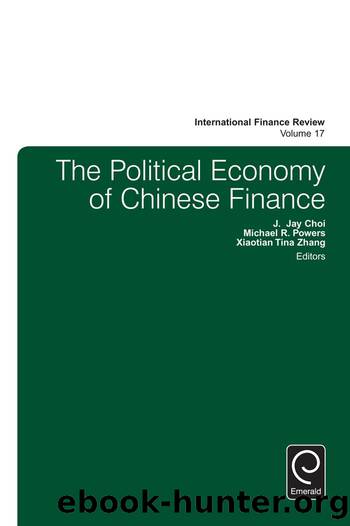The Political Economy of Chinese Finance by Choi J. Jay;Powers Michael R.;Zhang Xiaotian Tina;

Author:Choi, J. Jay;Powers, Michael R.;Zhang, Xiaotian Tina;
Language: eng
Format: epub
Publisher: Emerald Publishing Limited
Published: 2016-08-24T00:00:00+00:00
ISSUES OF SPLIT-SHARE STRUCTURE
With the rapid growth of Chinese economy and development of its financial markets, the government and regulatory authorities of China recognized the problems created by the predominance of non-traditional shares and the government ownership of SOEs, and hence launched split-share structure reform. In this way, shortcomings of the state ownership could begin to diminish. Hence, in order to make sense of the reforms and other developments of the Chinese privatization processes, it is important to identify these shortcomings.
One of the main shortcomings has been the existence of primary ownership of the Chinese government, in which SOEs structure was viewed as a problem, as the holders of traditional shares were mostly minority shareholders with limited power to influence management decisions. As stated by Megginson (2005), government ownership ensures that business enterprises balance social and economic objectives, such as maintaining employment rate, paying above-equilibrium wages, offering lower price than that of market, and constructing factories in underdeveloped regions. These objectives are mostly prevalent in the structures of various SOE operations; and the explanation for these objectives may be associated with economic or non-economic perspectives, which are not necessarily rooted in the notion of pure profit maximization, but in social foundations and causes pursued by SOEs.
However, the involvement of governments, central or local, in the ownership of firms in specific industries has had negative impact on the economic growth in China over the years. This has become a concern for the International Business scholars since they consider governments pursuing non-economic objectives may create inefficiencies in the way SOEs operate (Shleifer & Vishny, 1994). Some of the inefficiencies may be caused by the lack of incentives under the government ownership, impacting competition negatively in the market economy. When SOE managers have less incentive than those of privately owned firms, they may work less diligently towards revenue maximization and cost minimization (Shleifer, 1998). This has been true in the case of China and its most industries.
Second, in China the limitation on the free float of capital has made the domestic market extremely illiquid, volatile and thus prone to market manipulation as well as insider trading. Third, the inefficiencies experienced within the domestic market forced many valuable Chinese firms to list their stocks in overseas capital markets and in Hong Kong,4 which has become one of the most preferred destinations. However, this adversely affected domestic investors, who were prevented from investing in major firms in mainland China, as the stocks were listed in foreign capital markets. The investors were also restricted with holdings in the less performing local firms.
Download
This site does not store any files on its server. We only index and link to content provided by other sites. Please contact the content providers to delete copyright contents if any and email us, we'll remove relevant links or contents immediately.
The Brazilian Economy since the Great Financial Crisis of 20072008 by Philip Arestis Carolina Troncoso Baltar & Daniela Magalhães Prates(133836)
International Integration of the Brazilian Economy by Elias C. Grivoyannis(110733)
The Art of Coaching by Elena Aguilar(53201)
Flexible Working by Dale Gemma;(23286)
How to Stop Living Paycheck to Paycheck by Avery Breyer(19720)
The Acquirer's Multiple: How the Billionaire Contrarians of Deep Value Beat the Market by Tobias Carlisle(12316)
Thinking, Fast and Slow by Kahneman Daniel(12267)
The Radium Girls by Kate Moore(12018)
The Art of Thinking Clearly by Rolf Dobelli(10456)
Hit Refresh by Satya Nadella(9126)
The Compound Effect by Darren Hardy(8949)
Tools of Titans by Timothy Ferriss(8369)
Atomic Habits: Tiny Changes, Remarkable Results by James Clear(8327)
Turbulence by E. J. Noyes(8040)
A Court of Wings and Ruin by Sarah J. Maas(7822)
Change Your Questions, Change Your Life by Marilee Adams(7762)
Nudge - Improving Decisions about Health, Wealth, and Happiness by Thaler Sunstein(7694)
How to Be a Bawse: A Guide to Conquering Life by Lilly Singh(7472)
Win Bigly by Scott Adams(7184)
